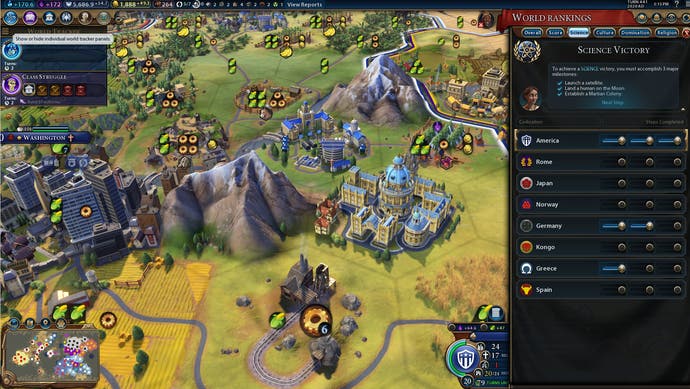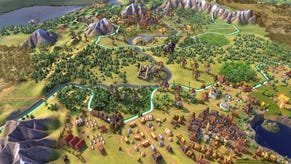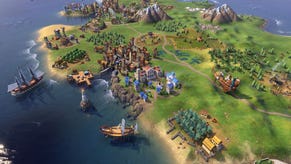Civilization 6 Science Victory - how to win the Scientific Victory Space Race in Civ 6
Everything you need to win the technological race to Mars in Civ 6.
Civilization's Science victories have become the most popular of any, likely because of, firstly, the frightfully compulsive feeling gained from progressing along that tech tree, and also the wonderfully predictive nature of those last few steps towards the looming world of Future Tech.
In Civilization 6, the Scientific victory functions in largely the same way as before. You must still get to almost the end of the Technology tree, and still assemble multiple components for space travel, albeit with the caveat that, this time, your final destination is the colonisation of Mars.
Before diving in here though, be sure to have read up on our dedicated guides to general Civilization 6 tips and tricks in our guide hub, a detailed look at Districts and the most optimal District placements, a walkthrough of Civ 6 Leader profiles and agendas, our early, mid, and late game Civ 6 strategies, and our guide for earning and spending gold.
A quick note: we've refreshed out Civ 6 guides for the game's launch on Nintendo Switch, but just be aware that they contain information regarding the Rise and Fall DLC as well as the base game, which means some things only apply if you have that DLC! Otherwise... crack on!
Scientific Victory conditions
Assuming you've already perused our Religious Victory and Military Domination Victory guides - fail to prepare and prepare to fail, and all that - it's time to delve into the specifcs of Science. The Scientific victory is split into three components - although each of those actually requires multiple steps to compete themselves. The key three milestones that must be accomplished are:
- Launch a satellite.
- Land a human on the Moon.
- Establish a Martian Colony.
To launch a satellite, you must first:
- Research Rocketry on the Technology Tree, which in turn allows you to…
- Build a Spaceport district in your cities.
- With the Spaceport built, you can then construct a Satellite project from the Production menu in any city with that district.
To land a human on the Moon, you must first:
- Research Satellites on the Technology Tree, which in turn allows you to…
- Begin a Launch Moon Landing project from any city with a Spaceport.
To establish a Martian Colony, you must first:
- Research Nuclear Fusion on the Technology Tree, which in turn allows you to…
- Begin the Launch Mars Reactor project from any city with a Spaceport.
- Research Robotics on the Technology Tree, which in turn allows you to…
- Begin the Launch Mars Habitation project from any city with a Spaceport.
- Research Nanotechnology on the Technology Tree, which in turn allows you to…
- Begin the Launch Mars Hydroponics project from any city with a Spaceport.
As you can probably see, achieving a Scientific victory is actually harder than it sounds, particularly because you're required to not only amass a huge amount of Science to get to the end of the tech tree, but also because you'll need to shift that Science focus into Production once it comes to completing Space Race projects. You can track your progress towards a Science Victory from the Science tab on the World Rankings menu, whilst we've also gathered up every method for how to earn Science in Civ 6 in our dedicated Science explainer, too, as an accompaniment to this victory guide.

If your lust for Civilization 6 knowledge is still going strong, expansion owners should take a look at our Civ 6 Rise and Fall guide hub which takes you through the basics of everything new, whilst we have dedicated pages on Governors and Loyalty, along with how to earn Golden Ages, Era Points and Era Score through Historic Moments, and a full list of new Civs in Civ 6 Rise and Fall and other DLC. Otherwise, our Civilization 6 guide, tips and tricks covers the essentials before you master early game, mid-game and late-game strategies. We also have tips on the new Districts feature, a Leaders list with their Traits and Agendas, plus the best ways to get Gold, Science, and Faith, how to win by Religious Victory, and how to earn the elusive Science Victory and Military domination victory. Finally, here's the Culture Victory, Foreign Tourism, and Domestic Tourism explained in depth.
How to win the Space Race - the best way to earn a Science Victory
As any Civ player will tell you, there just simply isn't one way to win the game by any victory type. Instead, winning a Science Victory is about adapting to the world around you, with all its complexities of diplomacy, war, religion, and natural resources.
There are, however, some defining principles which will generally hold true at all times:
- When placing Districts, prioritise your Campuses above all others - aside from perhaps your Industrial Zone, which will help with constructing projects for the Space Race - and think about not only the Campus but positioning for Scientific Wonders, too. You'll want some land next to a Campus for Oxford University, for example, but you should also be keeping an eye out for mountain ranges and jungle tiles that you can use to your advantage, too. We've explained the surprisingly deep complexities of Distric placement in our dedicated guide to District placement, if you want more detail.
- Don't neglect your other resources like Culture and Religion - whilst you can, and must, specialise for the best chance at victory, you'll also suffer greatly without advancing down your Civics tree, for instance, at a decent rate. The Great Library, for example, is a Scientific Wonder locked away behind Civic progression, whilst Religious Beliefs like Wat allow you to construct the Science-generating Wats by spending Faith, which could be the difference.
- Aim for at least one Scientific Wonder- Two is probably too much, and extremely hard to achieve, when one is locked away in the Technology Tree (Oxford University) and two (Oracle and Great Library) in the Civics tree. You'll be very fortunate to have the strength of both Culture and Science incomes to be racing down both of those trees ahead of all other Civlizations, and likewise you won't be so far behind without all Wonders to be unable to win the game. Your priority, really, is stopping another Civlization from obtaining two or more of the three, so pick one and rush to it first.
- Watch your Housing and Amenities like a hawk - They might seem minor, but actually both your Housing and Amenities play a huge part in your success. With a Housing deficiency, your cities will slow, and eventually cease, their growth, which you can't afford to lose at almost +1 Science per citizen. Likewise, your population's happiness is measured by Amenities in Civ 6, and that happiness dictates the bonuses or restrictions to non-Food yields (like Science) in each city. Try to hit that happiness bonus as often as possible.
- When you've researched the necessary techs, put everthing into Production - Unless you need to win via Score Victory, or acquire some essential Nuclear technology, there's no point at all in amassing Science after unlocking the techs required for Space Race projects. Instead, put every city you have onto a production focus, choose Trade Routes with the highest Production yield possible, chop down any forest tiles you have left, and rush those projects to completion. For us, even with a full tech tree unlocked, those projects generally took more than 20 turns each, so anything you can shave off that could end up making the difference.
- Don't be afraid to go Nuclear - Aside from being maniacally enjoyable to watch, Nuclear weapons can win you a Science Victory with surpising efficiency. Keep an eye on the Victory progress menu, and scout your nearest oppoents' land for Spaceports and, less importantly, Industrial Zones. If you can hit more than one with a 'nuke, you'll significantly slow their progress in the Space Race. Just be prepared for a bit of a diplomatic slap on the wrist...










